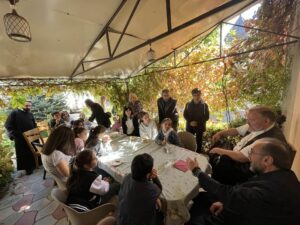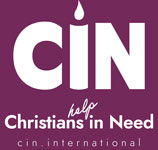For 1700 years, Nagorno-Karabakh was their home. Overnight they were expelled. Lost everything. Traumatized. The CiN integration project creates a new home for the people. And the children are learning to laugh again
A mother tells
“We were on the road for almost 18 hours. We left everything we had there. And nobody knows what will happen to us. Now we have nothing. We didn’t have time to take anything with us, just clothes and our documents.”
For poverty-stricken Armenia, with a population of just 2.9 million, 100,000 refugees from Nagorno-Karabakh are a major problem.
Karine Gyadukyan heads the socio-educational center of the Shirak diocese. She is our project manager on site. Karine writes: “The center currently works with around 200 families in need in Shirak and provides social, psychological, educational and humanitarian support for around 2,500 displaced families from Artsakh.”
Integration into the new home

The refugees are warmly welcomed. This makes it a little easier for them to settle into their new home.
CiN has pledged to support the integration of refugees. A total of 7,300 euros has been budgeted for workshops and training courses, a further 6,100 euros for spiritual, psychological and social support and counselling and 1,900 euros for cultural exchange programmes.
At the turn of the year 2023/24, additional help for the children and women to survive the winter is essential.
As a basis for an independent future for the families, courses are offered in bread baking, woodworking, nail care and hairdressing – all skills with which the refugees can begin to stand on their own two feet.
The project is initially scheduled to run for six months, i.e. until mid-2024, by which time we hope to have received enough donations to fund the project.
The aim is to promote social inclusion and acceptance between the displaced people and the inhabitants of the villages, to strengthen the refugees’ integration into the labour market and self-sufficiency and to facilitate access to important services and information.
In addition to workshops and training in the community, spiritual, psychological and social support for the families is crucial. For the children and women, coping with trauma is now a priority:
The children must not be left alone with the trauma of war and displacement.
The foundations can now be laid with psychological help so that the children can grow up in safety and psychologically stable. The clown’s visit (see cover picture) is a first step towards putting a smile back on the children’s faces.
Self-determination, successful integration into the new communities and overcoming the children’s traumas of flight are the central tasks:
Courage to live instead of despair over the loss of their homeland.
This is how the future is created.

